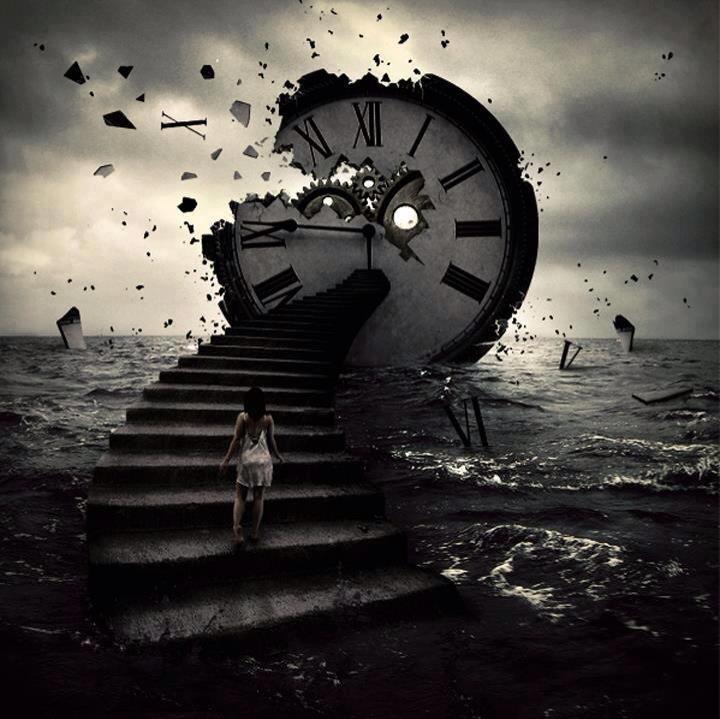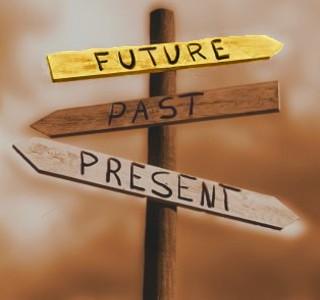The brain has lived in terms of psychological time for tens of thousands of years, perhaps much longer. Time, as becoming, has been humankind’s basic mode for as long as humans have been humans. Has that fundamental direction come to an end? And is there another mode for the brain altogether?
 The problem in exploring psychological time is that most people don’t realize that there is any other way to live. But there is, however rare it is. In the simplest sense, to not live in terms of time means grounding oneself in what is happening in the present, rather than coming from the past or looking ahead to the future.
The problem in exploring psychological time is that most people don’t realize that there is any other way to live. But there is, however rare it is. In the simplest sense, to not live in terms of time means grounding oneself in what is happening in the present, rather than coming from the past or looking ahead to the future.
In a deeper sense, it means seeing that the movement of thought is the movement of time. When thought falls silent, time ends; when time ends, thought is silent. Insight, renewal and love spring from the timeless state, not from thought in any form, including imagination.
Therefore to not live in terms of psychological time doesn’t mean returning to the animal state of pure presence, or some imagined Rousseauian Eden. Nor is it a ‘dream state,’ even in the Aboriginal sense of the term, which had the depth of thousands of years of mythologized time.
We need to make a clear distinction between chronological time and psychological time. Time by the watch, though it is still a construct of the human mind, is a very real thing, a necessity for planning, achieving goals and building anything. Without time by the sun or the watch, we would not be human.
Indeed, the dawn of our humanness occurred when people were first able to communicate a plan to meet at the end of the day with the food they had hunted or gathered. The basic capability of planning is at least hundreds of thousands of years old, though not until the emergence of ‘modern man’ less than 200,000 years ago was it fully developed cognitively.
Obviously, the human brain evolved the ability to make increasingly sophisticated plans, and all plans are based on time. But that capability has become highly dysfunctional, since on one hand humans are overrunning the earth and cutting the ground of nature out from under us, and on the other, we are spiritually dying as people and a species.
What is the essential action of living timelessly? To not living in terms of psychological time requires giving attention to what is as it arises within and around one, and remaining with it without interference. That is, to be present in the present.
This is the path of learning, which, once begun, is never-ending. Learning doesn’t even end with enlightenment, since other than during states of complete stillness of being questions and questioning go on. People often mistake questioning for a lower form of seeking, when actually it is the highest form of learning and teaching. So learning is the key, but not learning as we know it and have known it since the beginning of time.
There is positive learning and negative learning, and they are two completely different movements, in two  completely different directions. Positive learning is accumulative, and either grows in a precise and rigorous way, as with the knowledge of science, or in the non-rational and increasingly irrational way of experience.
completely different directions. Positive learning is accumulative, and either grows in a precise and rigorous way, as with the knowledge of science, or in the non-rational and increasingly irrational way of experience.
Negative learning has nothing to do with knowledge or experience however. It occurs when one holds knowledge in abeyance, and negates the known of experience through attention to thoughts and emotions as they arise in the moment. Paradoxically, spiritual advancement only occurs through negation.
Positive learning has its place obviously, but most people, especially highly educated people with egos and positions to maintain, assume it is the only form of learning. Not experiencing negative learning (which has nothing to do with having experiences) they are drowning in their own knowledge and experience.
The known is not just our knowledge, but our experience, conditioning, memories, associations, images and words. Not living in terms of time means not living in terms of the known. End psychological time, and the known ends; end the known, and psychological time ends.
Evidently, an illumined person does not live in terms of time at all. Is it that he or she can use knowledge and make plans as necessary, but that a transmutation occurs in them such that the baseline state of the brain is stillness and timelessness?
With these questions and insights in mind, I leave for the parkland. It’s mid-morning in early summer, and I’ve never seen the place more beautiful. A lush green canopy overhangs the placid stream, and light suffuses everything, even the shadows. Through the foliage across the creek, people walk, run and bike by, and children’s joyful voices can be heard from a couple hundred meters upstream.
Though it’s the middle of small city, there is no other sight or sound of human activity. Attention, acting without effort or will, quiets the mind, cleanses the heart and sweeps the brain clean of the detritus of recent experience. Everything is very close, without barrier, and there is the strength of vulnerability.
Just then a huge garbage truck pulls up on the closed, single-lane pedestrian road above the bank across the creek. The scene suddenly shifts from sylvan to sewer, as the noise and smell of the thing intrudes on what had been a spot of heaven.
After emptying the garbage cans, the driver gets back into the cab and turns off the motor. This is interesting, I think. I don’t want it to be there, but there it is, the essence of man of which I am an inextricable part.
Literally and metaphysically, here is the ugliness of man’s garbage and the necessity of its removal. The worker is performing that task outwardly, and one is performing it inwardly. Experiencing the timeless, one is cleansed and renewed. Learning is never-ending.
Martin LeFevre

